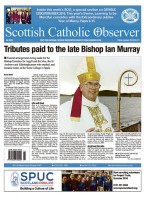January 29 | ![]() 0 COMMENTS
0 COMMENTS ![]() print
print

Website helps new annulment process
The Scottish Catholic Interdiocesan Tribunal based in Glasgow recently launched its own website scitribunal.org.uk. The website offers practical information forContinue Reading
The Scottish Catholic Interdiocesan Tribunal based in Glasgow recently launched its own website scitribunal.org.uk. The website offers practical information for those intending to apply for a marriage nullity. It is also a useful resource for those who simply want to know more about this aspect of the Church’s ministry.
Mgr Peter Magee, the judicial vicar of the tribunal, said that ‘the website will hopefully contribute in its own way to encourage those in need to clarify their marital situation before God and the Church.’
Mgr Magee added that while statistics show that the majority of cases which come before the tribunal do conclude with the granting of nullity, ‘it would be wrong to say to any applicant beforehand that their case will or will not be granted.’
From February 1 the basic application forms for a nullity will be changed. Mgr Magee asks especially the clergy to ensure that, from that date, the new forms will be used. The current forms, which can be downloaded from the website, should no longer be used.
“The new forms have been drawn up, in order to conform more fully to the legal procedures and, where appropriate, to implement the recent changes to the law promulgated by Pope Francis,” Mgr Magee said.
Some of these changes can affect interested parties directly. For example, it is now possible for the tribunal to process applications by an applicant who lives in Scotland, even if the other party does not and if the marriage took place outside of the country.
Previously, this could only be done after a series of permissions and conditions were fulfilled.
Another important change is that, if a case receives a judgment of nullity, it no longer needs to be confirmed by a second, higher court. This means that, if no appeal is lodged against that judgment, several months is knocked off the time taken for the parties actually to be able to marry in the Church.
The Pope has also introduced a briefer process,’ as opposed to the longer ‘ordinary process.’ A lot of people have mistakenly jumped to the conclusion that they can choose which one they want—which is most likely always going to be the shorter one.
“The briefer process can only be used under very specific conditions,” Mgr Magee said. “The decision as to whether this process may be followed falls by law to the judicial vicar.
“Even he can only invoke this process if those conditions are met. Whichever process is used, the fundamental principle remains the same: the judge or judges must be satisfied that the evidence before them gives them the certainty required to declare the marriage null.”











